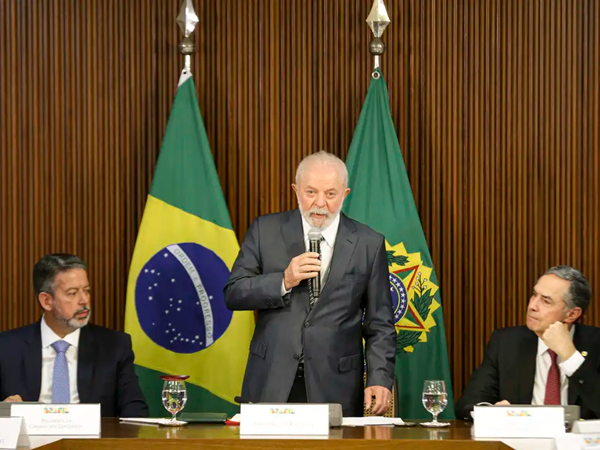A meeting on Tuesday (20) to address the impasse over parliamentary amendments brought together ministers from the Federal Supreme Court (STF), representatives from the Lula government (PT), and the presidents of the Chamber of Deputies, Arthur Lira (PP), and the Senate, Rodrigo Pacheco (PSD). The meeting was marked by a tense atmosphere. At the end of the meeting, representatives from Congress, STF ministers, and members of the federal government released a note announcing an agreement, which established that transfers could be resumed after guidelines were established to ensure greater transparency of resources within ten days.
This Content Is Only For Subscribers
To unlock this content, subscribe to INTERLIRA Reports.
Main Points
One of the points agreed upon provides for the maintenance of the Pix amendments, which are resources that go directly from the federal government to municipalities. However, the parties agreed that there was a need for the object to be identified in advance and for priority to be given to unfinished works, in addition to the need for accountability to the Federal Court of Auditors (TCU).
Regarding the other amendments, it was decided to maintain their imposition, but there would be regulation on the objective criteria for technical impediments. These parameters are to be established through a dialogue between the Executive and Legislative.
Linking to Current Revenue
They also reached a consensus that the Executive and Legislative branches will adjust the issue of linking parliamentary amendments to net current revenue. The goal is to ensure that they do not grow at a rate greater than the increase in total discretionary spending. According to Pacheco, the idea is to ensure that the growth of these amendments over the years remains proportionate.
Demands Met
The Lula government saw some of its demands met in the agreement and managed to redirect part of the parliamentarians’ resources to its projects. In an interview on Thursday (15), the President had said that Congress had sequestered part of the Budget. The reallocation of funds from the deputies’ amendments to structural projects in the states and of national interest, if confirmed, would represent the strengthening of resources for the New Growth Acceleration Program (PAC).
President of the STF
President of the STF, Luís Roberto Barroso, said that they were able to reach a possible consensus, given the different views on the subject. According to him, there was a consensus that there needs to be traceability and transparency of funds, that is, knowing who indicates and where the money goes, all under the control of the TCU. There was also agreement that Congress should play an important role in the allocation of the Budget and the need for new legislation on the quality of this spending.
Center of the Crisis
The issue of amendments is at the heart of a crisis between the three powers. On Friday (16), the Supreme Court unanimously upheld STF Minister Flávio Dino’s decision to suspend the execution of mandatory funds until deputies and senators provide more transparency to the transfers.
These are funds from benches, individual funds with a defined purpose, and special transfers, known as Pix amendments. They are a way for deputies and senators to send money for works and projects in their electoral bases and, in doing so, increase their political capital. However, Congress’ priority remains serving its electoral strongholds, rather than the areas with the greatest demand in the country.
Proposals in Congress
To support the agreement between the government to provide greater transparency to parliamentary amendments, Congress plans to resort to the 2025 Budget Guidelines Act (LDO) and a Proposed Amendment to the Constitution (PEC). Other issues, such as the amount of the Budget allocated to parliamentary funds, including individual and bench funds, will depend on changes to the Constitution.
Analysis:
The meeting between Supreme Court justices, representatives of the Lula government, and Congressional leaders to discuss the parliamentary amendments reflects a critical moment of tension and negotiation between the government in Brazil. The presence of high-ranking figures and the tense atmosphere indicate the seriousness of the impasse, which revolves around transparency and the use of public resources. The agreement reached, which promises to reestablish transfers after defining transparency guidelines, highlights the attempt to balance state control and the political demands of parliamentarians.
The Pix amendments, which allow direct transfers from the federal government to municipalities, have become a central point of this debate. Although they are seen as a tool to serve the electoral bases of parliamentarians, the lack of transparency and the questionable use of these resources call into question their effectiveness and ethics. The agreement that requires the prior identification of projects and the prioritization of unfinished works, in addition to the reporting to the TCU, represents a step forward in the attempt to moralize the process but still depends on effective regulation and rigorous oversight.
Finally, the political scenario reveals a growing distrust between the branches of government, with the STF playing a central role in mediating conflicts related to the public budget. The crisis generated by the parliamentary amendments exposes not only the dispute over resources but also the struggle for control of the budget, which is fundamental for the implementation of public policies.
Sources: A Folha de SP [1], [2], [3]; O Globo [1], [2], [3].




